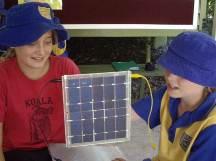 The Sustainable Futures day visit program is an opportunity for students to investigate how we use renewable and non-renewable resources at home and within a school setting, and the consequences of this use for the future. It includes activities around the focus areas of energy and water.
The Sustainable Futures day visit program is an opportunity for students to investigate how we use renewable and non-renewable resources at home and within a school setting, and the consequences of this use for the future. It includes activities around the focus areas of energy and water.
The energy activities will provide students with the opportunity to investigate traditional and alternative forms of power generation, and monitor the power consumption of common household appliances.
Water activities will focus on the need for catchment care to ensure healthy waterways and clean domestic use. Students will participate in a revegetation project to improve waterway health. Water activities will focus on the need for catchment care to ensure healthy waterways and clean domestic use. Students will participate in a revegetation project to improve waterway health.
This day program can be added to a multi-day excursion to provide further learning enrichment opportunities.
Australian Curriculum
links
Science
Year 5
Light from a source forms shadows and can be absorbed, reflected and refracted (ACSSU080)
Year 6
Electrical energy can be transferred and transformed in electrical circuits and can be generated from a range of sources (ACSSU097).
The growth and survival of living things are affected by physical conditions of their environment (ACSSU094).
Sustainability
OI.7 Actions for a more sustainable future reflect values of care,
respect and responsibility and require us to explore and understand
environments.
OI.8 Designing action for
sustainability requires an evaluation of past practices, the assessment of
scientific and technological developments, and balanced judgments based on projected future economic, social and environmental impacts.
Critical and creative thinking
Level 3
Explore situations using creative thinking strategies to propose a range of alternatives.
Level 4
Identify situations where current approaches do not work challenge existing ideas and generate alternative solutions.